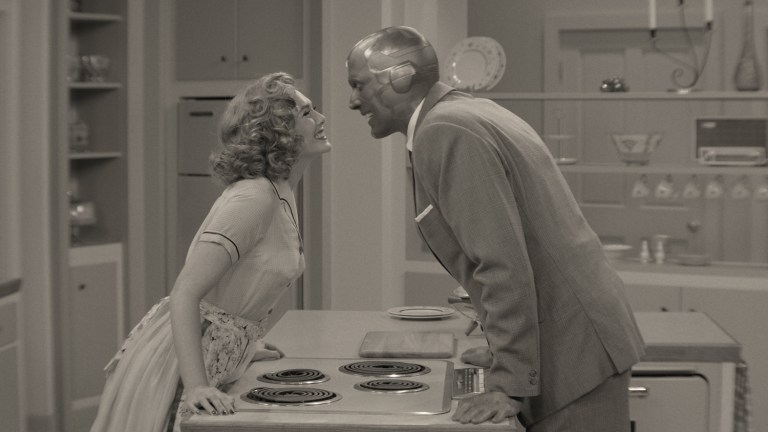WandaVision Episodes 1 and 2 Review (Spoiler Free)
Marvel Studios’ first limited series for Disney+ is exactly what it’s hyped to be -- but we all know there’s more to it than that.

Never let it be said that Marvel Studios doesn’t take chances. After an 18-month gap following the last film set in the Marvel Cinematic Universe, the Sony/Marvel co-production Spider-Man: Far from Home, the Disney-owned content juggernaut is finally launching its highly-anticipated Phase 4 slate with…a black and white sitcom that looks like someone has used the Time Stone to port it to the present directly from the 1950s.
Of course, we’re talking about WandaVision, which premieres this Friday on Disney+ with the first two of its nine episodes. As promised after months of hints, teases, photos, and finally trailers, WandaVision stars two of the most powerful beings in the MCU, Wanda Maximoff (Elizabeth Olsen) and the synthezoid known as Vision (Paul Bettany). The setting is derived from the studio-bound comedies of the ‘50s, with I Love Lucy being one touchstone while more obscure titles like I Married Joan also come to mind.
The “premise” of the show is that Wanda and Vision have just settled into domestic life in the blandly suburban, middle America town of Westview. Wanda acts as a somewhat hapless housewife (who uses her psychic powers to bail herself out of various amusing scenarios), while Vision goes to work as a numbers cruncher at some kind of generic computing company. They try to keep their powers (and in Vision’s case, his true nature) secret from locals such as the overly helpful, nosy next door neighbor Agnes (Kathryn Hahn).
The plot of the pilot episode (directed by Matt Shakman and written by creator Jac Schaeffer) is straight out of Sitcom 101: Wanda and Vision have an important date marked on their calendar, but neither can remember what it is. Naturally, hilarity ensues as they try to compensate.
Everything about the first episode of WandaVision — from the opening credits and theme song to the lighting to the décor of the couple’s home — is a loving tribute to the kinds of “wholesome,” squarely middle class, conservative family comedies that began to proliferate on TV around the mid-1950s and often lived on in syndication for years afterwards. There’s no question that these shows provided a gentle comfort to viewers in tumultuous times, although some also provided certain performers like Lucille Ball an outlet for truly inspired physical and domestic comedy. WandaVision acknowledges that while hinting, both literally and metaphorically, that all was not well under the surface.
Longtime MCU fans, of course, know that this is the case: Wanda was forced to kill Vision at the end of Avengers: Infinity War to prevent Thanos from getting the Mind Stone, although Thanos simply turned back time with the Time Stone and killed the poor bastard again right in front of his already devastated lover, this time obtaining the Mind Stone and snapping Wanda and trillions of others out of existence. An angry and quite possibly unstable Wanda returned with everyone else at the climax of Avengers: Endgame, but Vision remained very dead.
Or is he? How is Vision alive, and how have he and Wanda ended up in this strange black and white TV world? There are little hints peppered throughout the first episode, including Wanda-made glitches in the program and some in-universe meta commercials. While the early episodes of the show (Disney has offered us the first three) don’t contain much in the way of true surprises, it’s very clear that something is extremely amiss here.
The second episode darkens the mood slightly, while bringing the show into the realm of 1960s series like The Dick van Dyke Show and particularly Bewitched. The décor and look are updated, while the show moves out of the studio and does some outdoor shooting as well. As with the first episode, the plot is somewhat incidental — it’s the little breaks with reality and odd moments where this obvious illusion seems to slip that add gravitas to the surreal and otherwise amusing proceedings.
Watch everything Marvel and more on Disney+, right here!
That is what keeps WandaVision compelling throughout these first segments in the best tradition of the MCU: the viewer knows that this is all leading somewhere and is eagerly watching out for clues, but at the same time the narrative unfolding is entertaining in its own right. While much of that is due to the on-point writing from Schaeffer (right down to the sitcom-style one-liners) and confident directing from Shakman, it also falls squarely on the shoulders of the cast.
With Wanda previously portrayed in the MCU as a tormented, haunted character and Vision as a somnolent, enigmatic presence, both Bettany and Olsen showcase their comedic flare here, fully committing to the personas constructed around their characters in this scenario. They have a loving, immediate chemistry and are ably aided by Hahn, the very essence of the stock neighbor character but who also hints at something more threatening coiled just under her perfectly coiffed exterior.
Episode 2 ends on both a heartwarming and portentous note, including a plot development that will be very familiar to longtime readers of Wanda’s exploits in Marvel Comics. The third episode expands on all this in equally funny and dangerous ways, even as it hurtles into the next decade of sitcoms. But you’ll have to tune in next week for that. In the meantime, WandaVision is a welcome return for the MCU that gets its next phase off on unexpected footing but pays off both in entertainment value and the promise of developments to come.
WandaVision premieres this Friday (January 15) on Disney+.

